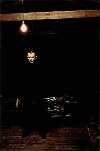by Gerad Delorme, French Premiere Magazine January 1997, own translation.
Four years after Twin Peaks, Lost Highway opened in France at world pre-premiere. A film even more bewildering than usually. David Lynch explains. In his own fashion.
We're at Asymmetrical, Lynch's Production Studio, located in the Hollywood Hills where David Lynch welcomes us. The atmosphere is very relexed and jovially. We talk to him in his shop which he set up in the basement. Newly framed abstract canvases, his oevre, are stored before a big circular saw. They're going to be shipped to Paris for an exhibition that will open in January, at the same time as the release of the movie. While they're serving us coffee Lynch is chain smoking cigarettes (he started again after twenty years of abstinence) and points at his latest creation, the wooden model of a lantern. Lynch speaks loud and clear, with simple words and in a peculiar diction that must have certainly rubbed off to some of his characters. Sometimes his answers are child-like, naive or evading, and it's good like that. Without the mystery his cinema wouldn't exist.
Is it really necessary to try to understand it?
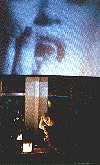 That might have happened to you, too, with a tape recorder. For some reason or another the tape is twisted for a certain moment and you hear in reverse what's recored on the other side. That's a little the effect of Lost Highway, Lynch's latest film. The first part of the film centers around a person (Bill Pullman) who has a house, a job (jazz saxophonist), a wife (Patricia Arquette) and a life. Almost without a transition (after all a horrible event had happened) the central person becomes a totally different one (Balthazar Getty). Bit by bit one becomes aware of how that what happened is this time the same thing and the opposite of what had happened to Bill Pullman. There's correspondence between the two worlds, common characters (most of all Patricia Arquette with a different wig) and a malevolant passenger like Bob in Twin Peaks. The film ends like it began. It reaches at its own return.
That might have happened to you, too, with a tape recorder. For some reason or another the tape is twisted for a certain moment and you hear in reverse what's recored on the other side. That's a little the effect of Lost Highway, Lynch's latest film. The first part of the film centers around a person (Bill Pullman) who has a house, a job (jazz saxophonist), a wife (Patricia Arquette) and a life. Almost without a transition (after all a horrible event had happened) the central person becomes a totally different one (Balthazar Getty). Bit by bit one becomes aware of how that what happened is this time the same thing and the opposite of what had happened to Bill Pullman. There's correspondence between the two worlds, common characters (most of all Patricia Arquette with a different wig) and a malevolant passenger like Bob in Twin Peaks. The film ends like it began. It reaches at its own return.
Those familiar with Lynch won't be surprised. If the filmmaker has evolved then it's the sense where he leaves the classic narration. More than ever his cinema is marked by the predominance of the intuition over the rationale. That's what he risks to get lost: certain "impossible" incidents have no rational explanation. Thus how comedians don't like to explain their jokes, Lynch has no rational solution to offer.
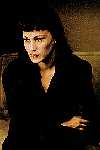
Why did pass four years between Twin Peaks and Lost Highway?
That already happened before. Everyone has to find a reason to invest himself
totally into a project. At the risk of forgetting anything else. This is the best of experiences. But you
have to find something that is making you crazy. Between "Blue Velvet" and "Wild at Heart" passed four years too. During that time I started something and, for one reason or another, it didn't go on. But I'm always looking for ideas. I read and think for that.
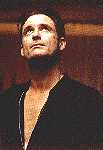 Is it true that you started Lost Highway with the two title words?
Is it true that you started Lost Highway with the two title words?
They're from a sentence of a novel by Barry Gifford. I told Barry: "I love the sound of these two words." And he said: "Let's write something." Each one of us matured his own ideas.
When we met again I didn't like his ideas and he didn't like mine. Then we began with the fragment of an idea that came into my mind during the last day of filming Twin Peaks: Fire Walk With Me.
After that a lot of things started to get together by themselves. We were on the way into a world
that revealed itself to us. And that's the result.
What attracted you to this story of double identities?
It didn't start like that right away, it just evolved into that direction. But I love the idea of identity trouble. You never know in advance what you're going to get. I don't say: "I'm going to make a movie about a nurse who helps the sick." An idea takes you by surprise, you see a sick-room, a nurse comes into the room, and the person who is in the room is sick. It's afterwards that you realize you're just about to make a movie about a nurse who's treating the sick. Sometimes it's only before you've finished that you realize what your doing. A movie is a collection of ideas which hook themselves together and that thrill you at a point when you realize that they're meaning something.
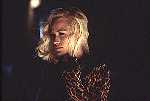 Have you discovered that there exists a word that qualifies what you depict in your movie?
Have you discovered that there exists a word that qualifies what you depict in your movie?
The psychogenic fugue. That is a real medical term that describes the condition of a person who takes on a new idendity, who's creating new friends, a new home, new parents, a completely new environment. That corresponds perfectly to our description. And I love the idea of a fugue. That's a piece of music, composed for various voices or instruments in which a theme is sung by one voice and is then developed by another one. And regarding "psychogenic", that's an incredible word!
You also wrote this story like a Moebius Strip.
Yes, but not before it was finished. We didn't decide a priori to build it in this form. You feel that this is working like a spiral circle that is replying to itself. Whatever you create there was always someone who has already invented a word to describe it.
 On a Moebius Strip there is a "break" corresponding to the transition between both edges of the band. Is it possibble to say that the break in "Lost Highway" happens at the moment when Bill Pullman becomes Balthazar Getty?
On a Moebius Strip there is a "break" corresponding to the transition between both edges of the band. Is it possibble to say that the break in "Lost Highway" happens at the moment when Bill Pullman becomes Balthazar Getty?
That's beyond any doubt an important transition for the character! It's also interesting how Bill Pullman talks to himself through the intercom!
Have you searched the script for logical inconsistencies?
Yes. But we weren't looking for a medical logic. It had to be logical for me and Barry. The script should be logical to itself. One thing works because it relates to the next one. Spinning the thread you're pulled into a good direction through beautiful indications. You really see how the story takes place. And you feel when it's right in a certain world. That's very exciting.
In which form come these ideas you're talking about?
Sometimes in sequences; another time they don't have a certain sound, but they contain indications of the form of what they should sound like. They have a mood, they have a feeling. They contain characters that reveal themselves to you with precision: they are particularly dressed, you understand them right away. Sometimes it comes all at once. Where does it come from? Within one minute, that's beyond our consciousness, and then, bing, there it reveals to you! That's a magical thing.
 You don't have any trouble to memorize all these things?
You don't have any trouble to memorize all these things?
No. That's just as if you open a door after you have heard the doorbell ring and
someone hits you a blow with a cudgel. You won't ever forget that. Sometimes it is important
to write down certain key details like sketching a dream. That can be the start for a future
development. But most of all you remember it because these ideas are very powerful.
Doesn't there exist a method for that?
 No. Matter of fact a method would be an obstacle. The real method is to let go and stay away from the thoughts. Not to disturb them. The important thing is to reach a place where you can lose yourself. And suddenly could something arrive there. Something that may be interesting. If you're working precisely on a project your world may be more limited but the desire to catch a story is like a bait. The other parts of the story are being attracted like a fish and hook themselves on you.
No. Matter of fact a method would be an obstacle. The real method is to let go and stay away from the thoughts. Not to disturb them. The important thing is to reach a place where you can lose yourself. And suddenly could something arrive there. Something that may be interesting. If you're working precisely on a project your world may be more limited but the desire to catch a story is like a bait. The other parts of the story are being attracted like a fish and hook themselves on you.
So in fact you go fishing?
I think there is a world where everything is already there. And the director just allows those things to present themselves to him. The film already exists in his final form and you just help it to become what it wants to be.
(...)
Do you write the dialogues yourself?
Barry wrote a lot of them, but we work together. If the dialogues sound simple they have to also go with the idea of the character and the situation. But that's at rehearsals where I get what I want.
It takes a lot of talking and trying. I have to talk for quite a while with certain actors. I talk to them
till it clicks (snaps his fingers). If that clicks with them then there's a chance so that they say what they have to say in a right way, with the right pacing.
They say you'd chosen Bill Pullman because he would, as well as Kyle MacLachlan, look like you.
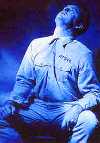 It's all about to find good actor to play the role. Bill was the first who came into our minds to play Fred. I always wanted to work with him because he is a regular guy. He's an actor but he has both feet on the ground. I also felt a different pretty intense side in him which wasn't exploited in his previous roles. What else have we in common? He doesn't live far away from me. He loves gardening. I love earth and gravel. I love to construct but certainly not to plant. Bill has more than two hectares of land on his hill. There grow all kinds of trees. I once went there to pay him a visit. It didn't take long and he would harvest a banana tree. They were fantastic!
It's all about to find good actor to play the role. Bill was the first who came into our minds to play Fred. I always wanted to work with him because he is a regular guy. He's an actor but he has both feet on the ground. I also felt a different pretty intense side in him which wasn't exploited in his previous roles. What else have we in common? He doesn't live far away from me. He loves gardening. I love earth and gravel. I love to construct but certainly not to plant. Bill has more than two hectares of land on his hill. There grow all kinds of trees. I once went there to pay him a visit. It didn't take long and he would harvest a banana tree. They were fantastic!
Did Patricia Arquette have any trouble? Her role is difficult...
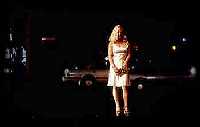 I couldn't ever say enough good things about Patricia. First of all, she hadn't filmed nude before. Nudity is causing her a lot of anxiety, even in her personal life. But she wanted to do it because she thought it was the logic of the character. While editing the movie I saw more and more, scene by scene, how she became better. She did it more and more subtly. She is more matured than her age suggests and at the same time a little nuts. That's very exciting.
I couldn't ever say enough good things about Patricia. First of all, she hadn't filmed nude before. Nudity is causing her a lot of anxiety, even in her personal life. But she wanted to do it because she thought it was the logic of the character. While editing the movie I saw more and more, scene by scene, how she became better. She did it more and more subtly. She is more matured than her age suggests and at the same time a little nuts. That's very exciting.
about the role of music in his films:
Here as well the thing is to talk to the people just to the moment when what they're proposing to you goes with the scene. With Angelo our discussions were very short cause we're used to work together. Barry Adamson who is a great English composer has a very particular style which is perfect for Mr. Eddy. After that we talked and Barry created the other pieces also fantastic. That was born out of our conversations.
It seems to be natural that Trent Reznor did cross your path one day. How did you meet him?
Through Jennifer [receptionist at Asymmetrical] who is a friend of him. Trent helped me a lot. I went to see him at his place in New Orleans. He has an excellent studio and a very sophisticated musical mind. He wrote two pieces for the movie. The soundtrack will be released on his label.
You're currently building your own sound studio next door.
 Yes. That's right next to my house. In the movie it was the home of Fred and Renee. We really devastated it for the movie and now we have to rebuild it. When it's finished I will call for Angelo and Trent. That'll be pretty much fun!
Yes. That's right next to my house. In the movie it was the home of Fred and Renee. We really devastated it for the movie and now we have to rebuild it. When it's finished I will call for Angelo and Trent. That'll be pretty much fun!
What do you think about the theory the cinema is dead and the only possible way out
would be to film thoughts?
Cinema is 100 years old. It's difficult today to make anything without being
compared with what's already been done. Yet cinema is still very lively. It can still
evolve and give us films of an unbelievable beauty. As for thoughts that's not entirely abstract.
As soon as a thought is born you can give him a form, a color, a flavor, a sound, a smell.
That's like capturing it with your mind. There wasn't anything an instant before but now it's
something. So you can try to construct something, to build a sequence out of these
things. That's what cinema is all about. Those ideas come out of the brain, are being transported
to the hand, transferred by a brush and exposed on a canvas. A house is born out of a thought
and transforms into a house. You can enter it and live in there. In the same way all filmmakers
film thoughts. Some more than others, and some ideas are more interesting than others; but
everything starts with an idea.
What do you think about digital effects?
You'll be able to do amazing things but that's also very expensive. An effect I'm interested in is to be able to choose my own lens. If you're using a wide angle, normally everything is distorted on the edge of the frame due to the "fish eye" effect. With the digital technology you can restore everything. You'd be able to put a tiny little camera on the top of the nose and the most bizarre angles and lights would still be in perfect focus. You can go digitally to unsuspected places. That's unbelievable!
Do you have had the chance to experiment?
I've made commercials. Those are in a way experimental films where you can
always learn something new. You also learn the economy, for example, how to say something
quickly. But to experiment and the freedom to do it are the basis of cinema. There always comes a moment where you don't know for sure if that what you're trying to do works. Maybe the
result isn't what you were looking for. And that's even better!
Did you make music videos?
I made two. But I feel there even more trapped as with commercials. I prefer when the music evokes the images by itself. I gotta pee. I had too much coffee.


